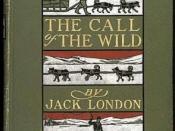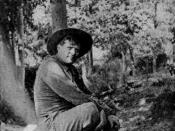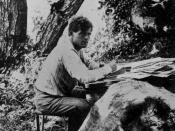Naturalism in Jack London's The Call of the Wild
In The Call of the Wild, Jack London uses the regression of Buck, an anthropomorphic dog, to illustrate the naturalistic principle of how the "forces of heredity and environment" govern the development of one's character ("American Literary Naturalism" 3). By concentrating on Buck's gradual reversion from civilized pet to primordial beast, London demonstrates how changes in environment can affect how "the strong, the shrewd, and the cunning" prevail when "life is bestial" (Pizer 110).
London describes Buck as a "sated aristocrat" and a "country gentlemen," who as the king of "all creeping, crawling, flying things of Judge Miller's place, humans included," leads a privileged life (18). However, due to the treachery of Manuel, a gardening assistant, Buck's social conditions change dramatically, and he finds himself kidnapped and subjected to cruelty at the hands of his new masters. When Buck is "jerked from the heart of civilization (the Judge's farm) and flung into the heart of things primordial (life in the Northland)," life itself becomes bestial, and he is unable to maintain control of his civilized identity (London 43).
In this new world, where "the law of club and fang" acts as the main principle by which dogs and humans exist, it becomes necessary for Buck to remain constantly aware of his environment in order to survive, and this ultimately sets into motion the awakening of the primordial beast suppressed in his atavistic instincts (London 60).
As the novel progresses, London reveals that Buck's new world-a harsh environment sharply juxtaposed with the comfortable life he knew in Santa Clara Valley-has neither "peace, nor rest, nor a moment's safety" (43). The "social context and environment" of this new world affects Buck's "interaction and character development" within it, compelling him to...


